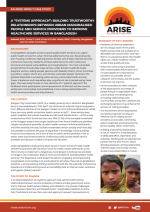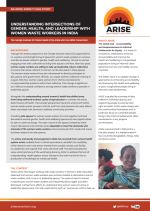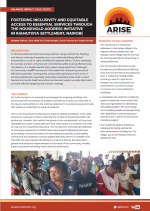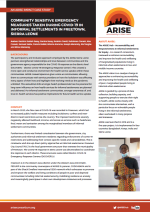In Bangladesh, equitable access to good quality health services is an urgent public health concern for urban informal settlements that are characterised by poor housing conditions, high population density, lack of basic essential services and tenure insecurity. Residents of these settlements live with continuous structural and spatial vulnerabilities and marginalisation. The most vulnerable groups (MVGs) […]
Through the ARISE programme, the George Institute India (TGI) supported the co-creation and strengthening of spaces for women waste workers to convene and discuss issues related to gender, health and wellbeing. This led to women engaging more with collectives to bring their issues to the fore. After four years, women waste workers are willing to […]
In informal settlements like Kiamutisya (Nairobi, Kenya), where fires, flooding, and disease outbreaks frequently occur, accurately identifying affected households is crucial for rapid and effective response efforts. Cholera outbreaks, for example, are best contained and controlled by swiftly locating affected areas. The absence of a reliable identification system poses significant challenges for Community Health Promoters […]
The participatory and inclusive approach employed by the ARISE Sierra Leone partners strengthened relationships and trust between communities and the government agency responsible for the COVID-19 response at the district level (DICOVERC – District COVID-19 Emergency Response Centre). This created a more open and conducive environment for health service uptake within these communities. ARISE created […]
Supported by the ARISE Responsive Challenge Fund, the African Population and Health Research Centre (APHRC) worked with Child Space Organization to reach out to children heading up households in the attempt to address the vulnerabilities and marginalities they face. Child headed households (CHHs) refer to families that have a minor as the head of the […]
Waste workers-otherwise known as sanitation workers-are often made invisible due to informal work arrangements. In India, as in other parts of the world, sanitation workers tend to be from the oppressed and marginalized communities with little access to healthcare and quality health services. This despite, their work being highly important to society and exposing them […]
Decolonising health research requires a shift to inclusive processes, and actively engaging with communities. Community-based participatory research (CBPR) fosters collaboration among communities, researchers, and implementers to produce contextual knowledge for action. Enhancing co-production skills and competencies has been shown to improve research quality and validity, while CBPR principles have been developed, limited guidance exists on […]
Waste pickers in India are extremely vulnerable to a range of health problems due to their poor living and unsafe working conditions, and struggle to access the health services they are entitled to. This research uses a community-based participatory research and focuses specifically on vector-borne diseases in two districts of Andhra Pradesh, exploring how they […]
In Kenya, the pregnancy rate of 15% among adolescents aged 15–19 years is alarmingly high. Adolescent girls living in informal urban settlements are exposed to rapid socio-economic transitions and multiple intersecting health risks and may be particularly disadvantaged in accessing sexual reproductive health services. Understanding vulnerabilities and service-seeking behaviours from different perspectives is important in order […]
In this episode of the Health Policy and Planning Podcast, LSHTM’s Public Engagement Manager, Karl Byrne is joined by our colleague Linet Okoth from LVCT Health. They talk about her paper “Policy and practices shaping the delivery of health services to pregnant adolescents in informal urban settlements in Kenya.” It’s a fascinating conversation that covers […]









